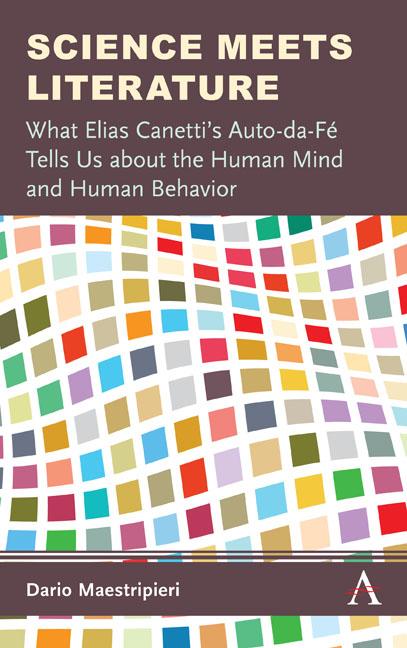 Science Meets Literature
Science Meets Literature Book contents
- Frontmatter
- Contents
- Preface
- Acknowledgments
- Chapter One Why Science and Literature?
- Chapter Two Elias Canetti: A Visionary Literary Genius on a Quest to Understand Human Nature
- Chapter Three The Plot of Auto-da-Fé
- Chapter Four Auto-da-Fé Is a Novel about Human Nature
- Chapter Five Major Themes Running Through Auto-da-Fé
- Chapter Six Analysis of Part I: A Head Without a World
- Chapter Seven Analysis of Part II: Headless World
- Chapter Eight Analysis of Part III: The World in the Head
- Chapter Nine Narrative Strategies in Auto-da-Fé
- Chapter Ten Consilience, the Canetti Way
- Elias Canetti: Chronology
- References
- Index
Chapter One - Why Science and Literature?
Published online by Cambridge University Press: 06 July 2019
- Frontmatter
- Contents
- Preface
- Acknowledgments
- Chapter One Why Science and Literature?
- Chapter Two Elias Canetti: A Visionary Literary Genius on a Quest to Understand Human Nature
- Chapter Three The Plot of Auto-da-Fé
- Chapter Four Auto-da-Fé Is a Novel about Human Nature
- Chapter Five Major Themes Running Through Auto-da-Fé
- Chapter Six Analysis of Part I: A Head Without a World
- Chapter Seven Analysis of Part II: Headless World
- Chapter Eight Analysis of Part III: The World in the Head
- Chapter Nine Narrative Strategies in Auto-da-Fé
- Chapter Ten Consilience, the Canetti Way
- Elias Canetti: Chronology
- References
- Index
Summary
Existential Questions
Who are we? Where did we come from? Where are we going? How do we explain human existence? How do we explain what we call the “human condition”? We human beings have been asking ourselves these questions for millions of years, since our ancestors evolved a brain that was sufficiently large and complex to give us the ability to consciously reflect upon ourselves as well as the ability to talk about it. We all ask ourselves existential questions at some point in our lives. Some are unable to find satisfactory answers and come to believe that human life is an unsolvable mystery; others accept the answers that are given to them by their parents, society, culture, religion, or their professional education.
Human beings have the ability to acquire knowledge about their own essence and existence, and such knowledge can be objectively recognized by others and shared with them. For example, we all learn and accept some basic facts about how our bodies are built and how they function. Each generation teaches these facts to the next one, using verbal, written, or digital language-based education. No one in their right state of mind would challenge the knowledge about the human body that is currently taught in professionally accredited medical schools. Each one of us, however, also has the unique subjective experience of existence and the unique subjective perception of himself/ herself and of the outside world through his/ her senses and thoughts. The extent to which this subjective experience of existence can be objectively recognized by others and shared with them is a matter of debate.
Although human existential questions can be tackled by anybody older than 4– 5 years of age, there are people who undergo specialized education and training to search for answers to these questions, and who spend their entire professional lives studying and researching these answers. Some of these folks are university professors. Part of their job is to learn any relevant knowledge acquired throughout past human history, generate new knowledge, and then transfer all knowledge to the younger generations through education and teaching. Every year, universities around the world recruit a new cohort of students to whom professors can teach everything that we, as a species, have learned about ourselves during the course of our long history.
- Type
- Chapter
- Information
- Science Meets LiteratureWhat Elias Canetti's Auto-da-Fé Tells Us about the Human Mind and Human Behavior, pp. 1 - 10Publisher: Anthem PressPrint publication year: 2019


